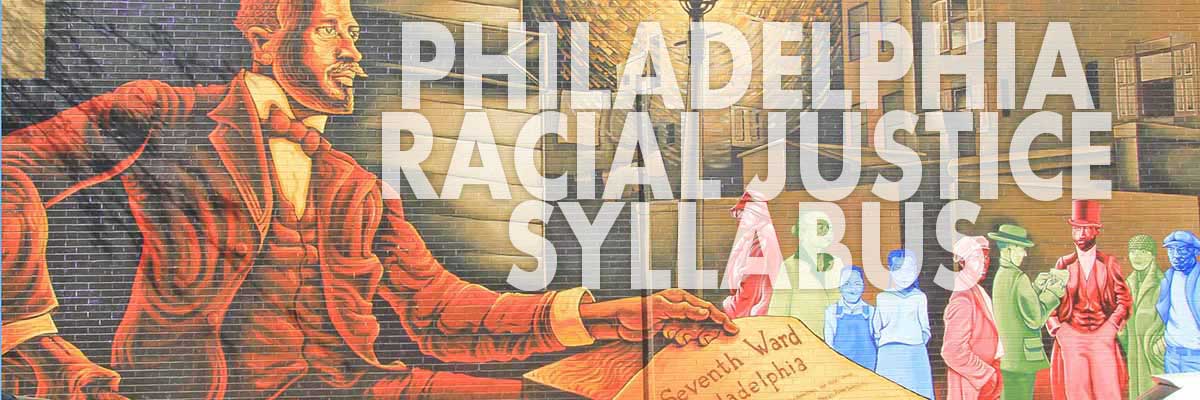Racial Justice

Power, inequality, and systematic racism have been topics at the heart of sociological inquiry for more than a century. W.E.B. DuBois, an African American Sociologist who revolutionized the study of race through his research here in Philadelphia, among other places, declared that “the problem of the Twentieth Century is the problem of the color-line.” DuBois’ statement remains as true today as it was in 1903.
In commitment to pursuing racial justice through research and teaching, the Department of Sociology prepared this statement on racial inequality and this Philadelphia Racial Justice Syllabus for teaching the history of racial justice in Philadelphia.
Download the Syllabus
Statement on Racial Inequality — Black Lives Matter
We, the faculty and staff of the Department of Sociology at Drexel University, are grieving in anger about the murders of George Floyd, Breonna Taylor, Ahmaud Arbery, Rayshard Brooks, and untold others, known and unknown, that have occurred at the hands of police or in the name of racist vigilantism.
Power, inequality, and systematic racism have been topics at the heart of sociological inquiry for more than a century. W.E.B. DuBois, an African American Sociologist who revolutionized the study of race through his research here in Philadelphia, among other places, declared that “the problem of the Twentieth Century is the problem of the color-line.” DuBois’s statement remains as true today as it was in 1903.
During the twenty-first century, we have publicly witnessed what generations of Black Americans have privately experienced: brutal treatment at the hand of the state. Black Americans are disproportionally suffering in sickness and death, higher rates of incarceration, economic losses and unequal educational opportunities. These systematic injustices are particularly stark today and reflect patterns long traced by sociologists. This spring, disparate mortality rates from the coronavirus pandemic and video evidence documenting patterns of police brutality lay bare the precariousness of Black American lives.
We bear witness to the many Black lives lost through systematic injustices for too many years. We celebrate the uprisings of the people in every single state of the U.S. and globally. We echo the call by Black Lives Matter to end the excessive policing of Black Americans. Excessive policing is a strategy wielded to manage the consequences of systematic inequality, poverty, and racism in the United States. We support calls for an immediate end to racist and discriminatory practices in policing. We support calls for a dramatic reversal in funding priorities by the federal, city and state governments, as well as colleges and universities, to defund the police and invest those funds in housing, schools, public health and other social and economic needs in Black communities.
As sociologists, we have a unique opportunity to deepen our shared commitment to bringing about systemic change through research, student support, and public efforts to speak truth to power in our local, national, and global communities. As we observe patterns of inequality reproduced in our institutions of higher education, we will redouble our efforts to support our Black students by directly addressing oppression in the classroom. We must listen to the experiences of those most at risk of state-sanctioned violence, and fully reckon with our obligation to educate those whose knowledge of such injustice has only been in the abstract. This education expands beyond the classroom—we in sociology must continue to communicate data about racial inequality in the United States to the public and elevate the often-uncelebrated hard work that others have done for decades to highlight institutional racism. We join in protest, community activism, and financial support to organizations and movements committed to racial justice. We express our commitment to create inclusion in our own community in Philadelphia by sensitizing our ears to marginalized voices, and naming injustices when seen.
We issue a call to action on multiple scales.
- We call on Drexel to end racist and discriminatory practices in its police department: to defund it, remove its mandate to cover problems better addressed outside of policing, such as mental health and homelessness, and reallocate these resources to strengthen and establish programs that are better suited to handle these issues.
- We call on Drexel to narrow the police department’s scope of responsibility to the university rather than the surrounding community.
- We call on Drexel to commit to hiring and retaining historically underrepresented minority faculty and staff and to hiring Black faculty currently in non-tenure track positions at Drexel into tenure track positions.
- While we commend Drexel for its commitment to establish a new Center for Black Culture, we call on the University to commit to fund existing centers and programs that are concerned with inclusion and equity in higher education (for example, Africana Studies and Womens and Gender Studies) for at least five years.
- We join others in academia in calling for the intentional diversification of curriculum, research, and public scholarship in ways that amplify the work done by Black scholars.
We encourage all individuals, as witnesses to this important moment in history, to educate themselves about the history of systemic racism and policing in the United States. Towards that end, we have developed a Philadelphia Racial Justice Syllabus to guide reading and learning.
We commit to doing the following in AY 2020-2021
- Reviewing and revising our syllabi to amplify the work done by Black scholars
- Organizing reading groups around the Philadelphia Racial Justice Syllabus
- Focusing our Sociology Film Series and Colloquia around issues of racial justice